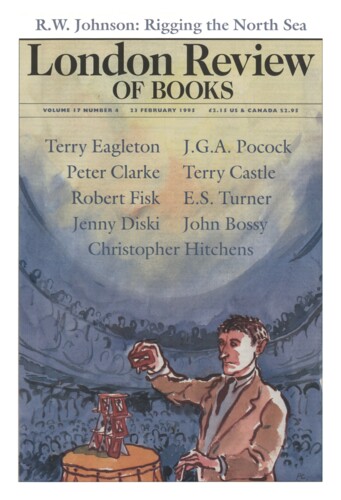Terry Castle
Terry Castle has taught at Stanford since 1983. Her books include The Apparitional Lesbian, The Female Thermometer: 18th-Century Culture and the Invention of the Uncanny and a memoir, The Professor. She has written in the LRB about Jane Austen’s letters to her sister, Cassandra; about meeting Hillary Clinton; her uneasy semi-friendship with Susan Sontag; Patricia Highsmith’s worst thoughts; and her obsession with Art Pepper.
Sublimely Bad
Terry Castle, 23 February 1995
How bad are most of the novels produced by English women writers in the decades before Jane Austen? Sad to say, just when one thinks one has read the very worst of them, another comes along to send one’s spirits plummeting further. Eliza Fenwick’s excruciating pseudo-Gothic epistolary novel, Secresy; or, The Ruin of the Rock (1795), is hardly the first ‘lost’ 18th-century woman’s novel to be resurrected over the past decade by feminist literary historians. Other recent finds include Eliza Haywood’s snooze-inducing The British Recluse from 1722 (‘a sad Example of what Miseries may attend a Woman, who has no other Foundation for belief in what her Lover says to her, than the good Opinion her Passion has made her conceive of him’); Sarah Fielding’s deeply unpleasant David Simple (1744), in which characters with names like Spatter, Lady Know-All and Mr Varnish assail the gormless hero until he drops dead of despair; and Sarah Scott’s thoroughly demoralising Millenium Hall (1762), on the supposed consolations of living in a grim all-female community where one does nothing but sew all day and read aloud from Scripture with one’s pious fellow virgins. Whether, given the competition, Secresy is so ‘sublimely bad’ – in Pope’s phrase – to take the crown of ultimate badness, remains to be seen.’
Podcasts & Videos
Peeping Pat
Terry Castle and Thomas Jones
Terry Castle talks to Thomas Jones about Patricia Highsmith.
Pieces about Terry Castle in the LRB
One Night in Maidenhead
Jean McNicol, 30 October 1997
‘Honey, she’s a forerunner, that’s what she is, a kind of pioneer that’s got left behind. I believe she’s the beginning of things like me.’ Radclyffe Hall has...
Paean to Gaiety
Lorna Sage, 22 September 1994
In this camp and dashing and deliberately lightweight study of a certain strand of ‘sexual ontology’ Terry Castle pursues the lesbian-as-ghost from Defoe’s wistful nearly-real...
Read anywhere with the London Review of Books app, available now from the App Store for Apple devices, Google Play for Android devices and Amazon for your Kindle Fire.
Sign up to our newsletter
For highlights from the latest issue, our archive and the blog, as well as news, events and exclusive promotions.

